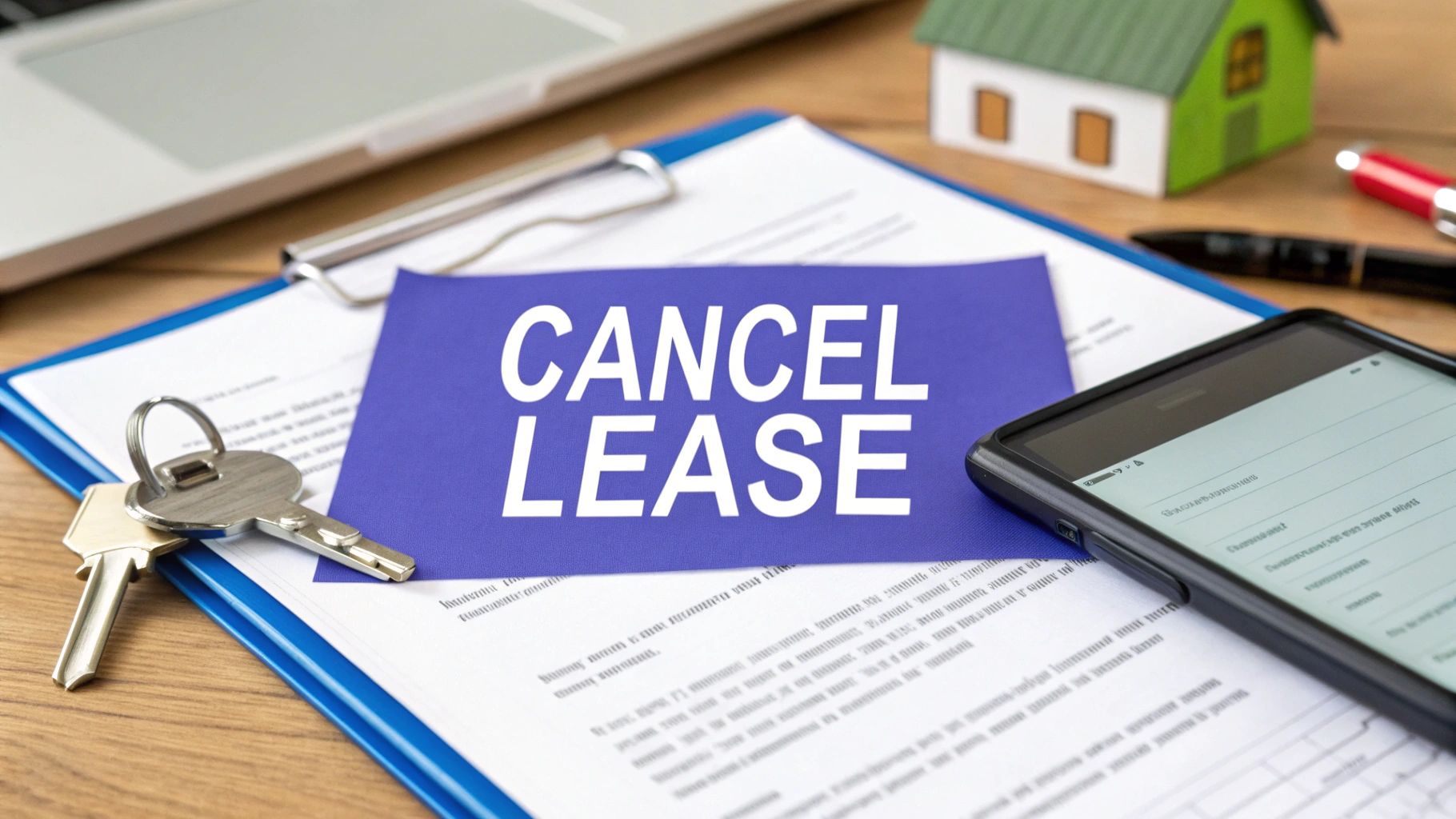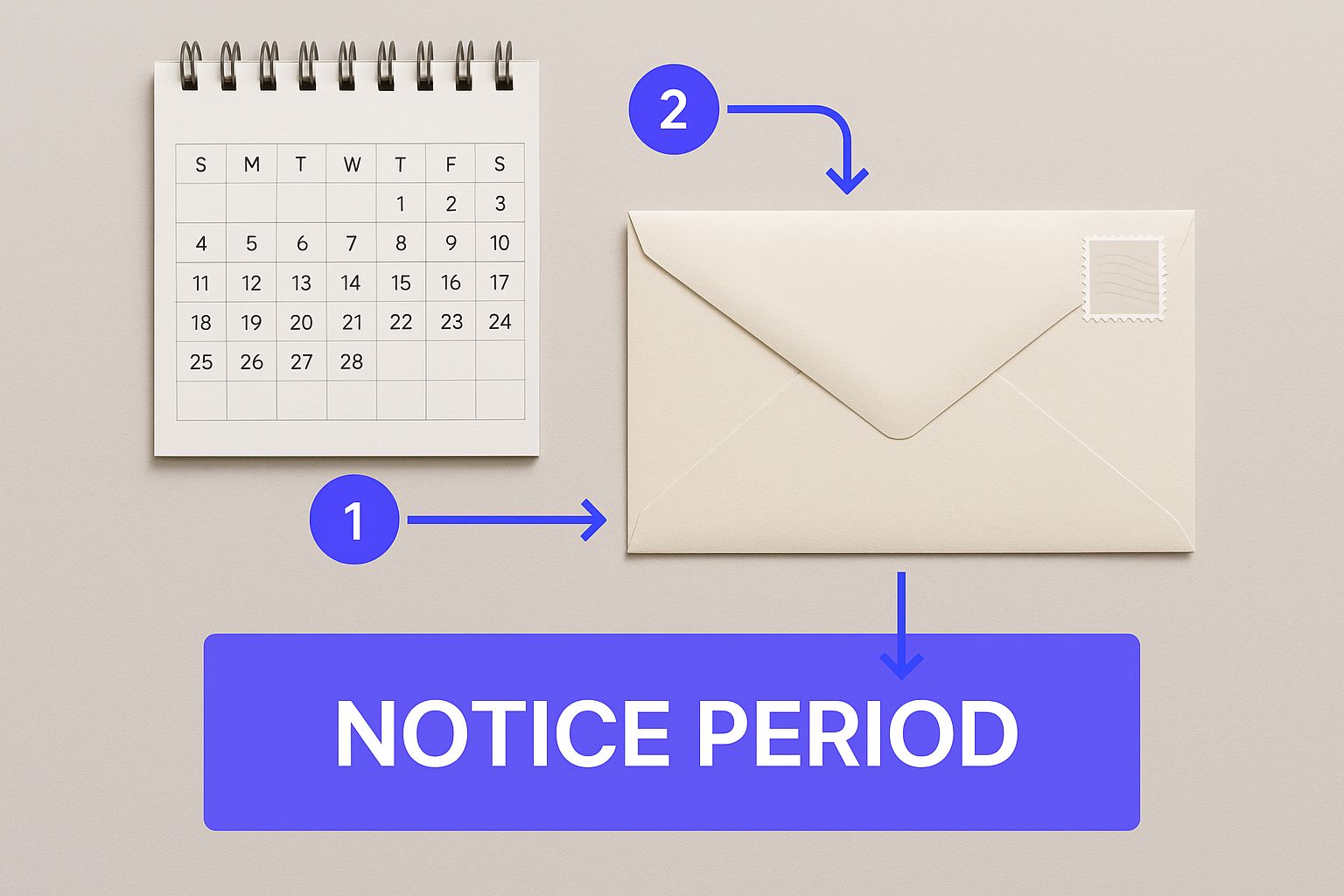
Know Your Rights Before You Cancel a Rental Contract
Canceling a rental contract can be a tricky process. Understanding your rights is the first step to making it smoother. This means getting familiar with federal and state tenant protections. These protections outline when you can legally break a lease without penalties. Knowing them is key to avoiding unexpected costs and legal issues.
Understanding Lease Types and Local Laws
It’s important to understand the difference between month-to-month agreements and fixed-term leases. Month-to-month agreements are more flexible. They usually only require 30 days' notice to cancel. Fixed-term leases, however, lock you in for a specific time, often a year. Breaking a fixed-term lease early can lead to penalties unless certain circumstances apply. Local laws can also affect your rights. So, researching your specific area is essential. You might find this helpful: Understanding Lease Terms.
Protected Circumstances for Penalty-Free Termination
There are several protected circumstances that allow you to break a lease without penalties. Military deployment, for example, lets service members end their lease without financial consequences. Situations involving domestic violence often provide legal ways to break a lease early. Also, if a property becomes uninhabitable due to things like serious disrepair or dangerous conditions, tenants may have legal grounds for termination.
Market Trends and Their Impact on Tenant Rights
The U.S. rental market is always changing. This impacts tenants’ decisions to cancel rental contracts. Demand for longer leases, energy-efficient units, and pet-friendly accommodations is growing. Combined with changing rent prices and available units, these factors influence tenants' choices. They sometimes lead to contract cancellations. For instance, as of December 2024, the national median rent was $1,373. This was a 0.6% decrease from the previous month. Over 40% of renters were looking for pet-friendly apartments. These trends highlight the dynamic rental market and its impact on tenant choices. You can find more detailed statistics here: Rental Market Trends. Understanding these trends helps you weigh your options and make informed decisions about your rental contract.
Why People Actually Cancel Rental Contracts Today

Understanding why people cancel rental contracts offers helpful insights for your own situation. A variety of factors contribute to this decision. These can include personal circumstances and broader market trends. Let's explore some of the most frequent reasons.
Life Changes and Unexpected Events
Life is full of surprises. These surprises sometimes require a change in living arrangements. For instance, a sudden job relocation across the country could necessitate breaking a lease.
Similarly, family emergencies or major lifestyle changes can also lead to a move. A growing family might need a larger space. A change in relationship status might lead someone to seek new living arrangements.
These personal situations are often unavoidable. Canceling a rental contract becomes a necessary, if sometimes difficult, process.
Property Issues and Landlord Disputes
Problems with the property itself can sometimes be the main reason for canceling a lease. Ongoing maintenance issues that a landlord doesn't address can make a home unlivable.
Disputes with landlords about the lease or other issues can also create a negative rental experience. This can lead tenants to look for other housing options. These situations highlight the importance of good communication and addressing problems early on.
Market Influences and Remote Work Trends
The rental market itself also influences cancellation decisions. Changing market conditions, like rising rental prices or limited availability, can make other housing options more attractive.
The rise of remote work has also given tenants more choices about where to live. This has contributed to shifts in what people want in a home. The global real estate rental market is expected to reach $2,915.55 billion by 2025. This reflects changes in how people rent, including cancellations.
This market growth suggests that renters are becoming more cautious with new leases. This could mean more cancellations as the market adjusts. Learn more about the changing real estate market in the Real Estate Rental Global Market Report. Considering these broader trends provides a more complete picture of why individuals cancel rental contracts. All of these factors combined demonstrate the many reasons people decide to cancel a rental agreement. Understanding these factors can help you better manage your own housing situation.
Your Step-By-Step Process To Cancel a Rental Contract
Canceling a rental contract involves careful planning and attention to detail. This guide will take you through each step of the process, helping you understand the complexities and protect yourself.
Review Your Lease Agreement Thoroughly
The first and most crucial step is to carefully review your lease agreement. This document outlines the terms of your tenancy, including the specific procedures for cancellation. Pay close attention to the notice period, early termination fees, and any situations where you might be able to cancel without penalty. Understanding these details can save you from unexpected costs and legal issues.
Calculate Potential Costs and Explore Alternatives
Before you officially cancel, it's important to understand the potential financial implications. This includes calculating any early termination fees, the potential loss of your security deposit, and any remaining rent payments you might owe. Getting a clear picture of these costs will help you make informed decisions. Consider exploring alternatives like subletting your apartment or lease assignment as ways to potentially minimize your financial losses. You might also find helpful resources online, like this article: How to master canceling your lease agreement.
Draft a Formal Cancellation Notice
Once you've decided to cancel, draft a formal written notice to your landlord. This notice should clearly state your intention to cancel, your desired termination date, and the reason for your cancellation. Make sure you adhere to the required notice period, typically 30 or 60 days, as specified in your lease. Maintaining a professional and respectful tone in your communication is always a good practice.

This infographic highlights the importance of providing sufficient notice when ending a lease, as symbolized by the calendar and envelope.
Providing adequate notice is a cornerstone of a smooth cancellation process. It helps minimize potential disputes and ensures a smoother transition for both you and your landlord. Remember, proper documentation is key.
Document Everything and Communicate Effectively
Throughout the process, keep detailed records of all communication with your landlord. This includes emails, letters, and notes from phone calls. Documenting the condition of the property with photos or videos is also recommended, especially if you foresee any potential disputes concerning your security deposit. Open communication with your landlord can help prevent misunderstandings and ensure a smoother transition.
Handle Logistics and Final Walkthrough
Work with your landlord to schedule a final walkthrough of the property. This is a chance to address any outstanding maintenance issues and confirm the overall condition of the property. Both parties can agree on any necessary repairs and their associated costs. Make sure all utilities are transferred out of your name to avoid continued billing. Finally, get written confirmation from your landlord about the return of your security deposit and any deductions.
Understand Specific Timelines and Procedures
Cancellation timelines and procedures vary based on the lease type. Month-to-month agreements typically require shorter notice periods than fixed-term leases. Understanding these nuances is crucial for a legally compliant cancellation. Review your lease agreement and familiarize yourself with local regulations. This careful approach will ensure a successful and hassle-free cancellation of your rental contract.
To illustrate the variations in timelines and procedures, refer to the table below:
Rental Contract Cancellation Timeline by Lease Type Comparison of required notice periods and procedures for different rental agreement types
| Lease Type | Notice Period | Required Documentation | Typical Penalties |
|---|---|---|---|
| Fixed-Term (e.g., 1 year) | Typically 30-60 days, as specified in the lease | Written notice of intent to vacate | Early termination fees (e.g., 2-3 months' rent), loss of security deposit |
| Month-to-Month | Typically 30 days | Written notice of intent to vacate | Potentially one month's rent, depending on the agreement |
| Week-to-Week | Typically 7 days | Written notice of intent to vacate | Potentially one week's rent, depending on the agreement |
Key takeaway: Notice periods and potential penalties vary depending on your lease type. Fixed-term leases generally have longer notice requirements and greater potential penalties for breaking the lease early compared to more flexible month-to-month or week-to-week agreements. Always refer to your specific lease agreement and local laws for accurate information.
Smart Strategies To Minimize Cancellation Costs
Breaking a lease can be a financial headache. However, with a little planning, you can significantly reduce the costs involved. Let's explore some proven strategies to help you keep more of your money when you need to cancel a rental contract.
Understanding the Potential Costs
Before you make any decisions, it's crucial to understand the potential financial impact of canceling your lease. Identify all possible expenses. This might include early termination fees, which can often equal two or three months' rent. Don't forget to consider the potential loss of your security deposit.
You might also be held responsible for paying rent until the landlord finds a new tenant. Getting a clear picture of these potential costs helps you create a realistic budget and explore the best options for your situation.
Negotiation Tactics That Work
Communication is key. Talk to your landlord. Explain your reasons for needing to cancel the lease. Propose solutions that could benefit both of you. For example, offer to find a replacement tenant yourself. This can relieve the landlord of a significant burden.
Alternatively, you might suggest covering the advertising costs associated with finding a new tenant. Understanding the potential legal ramifications is important. For more information, check out this guide on assessing contract risk.
Subletting and Assignment: Creative Solutions
Explore creative options like subletting or assigning your lease. Subletting means finding someone to take over your lease for the remaining term, or a portion of it. You remain responsible for the rent if the subletter fails to pay. Assignment, on the other hand, transfers all your lease obligations to a new tenant.
While both options require landlord approval, they can effectively eliminate your ongoing financial responsibility. These solutions can be beneficial for both you and your landlord.
When Legal Help Makes Sense
Sometimes, situations become complex. If you encounter an uncooperative landlord or have a complicated lease agreement, seeking legal counsel is a good idea. A lawyer can help you understand your rights, navigate the terms of your lease, and negotiate a fair settlement.
While legal representation involves a cost, it can be a worthwhile investment. It can potentially save you from significant financial losses or protect you from legal action.
Creating Win-Win Agreements
Aim for a solution that benefits both you and your landlord. Put yourself in their shoes. Landlords are primarily concerned with minimizing vacancy and ensuring consistent rent payments. By presenting solutions that address these concerns, you increase the likelihood of reaching a mutually agreeable compromise.
Cost-Benefit Analysis: A Practical Approach
Before making any final decisions, conduct a cost-benefit analysis. Carefully weigh the costs of each option against the potential savings. Include potential legal fees in your calculations. This objective assessment will help you determine the most financially responsible course of action. By taking a proactive and strategic approach, you can navigate the lease cancellation process and minimize its financial impact.
Explore These Alternatives Before You Cancel

Before going through the often complicated process of canceling a rental contract, consider other options. These alternatives can often resolve your concerns without the financial and logistical challenges of breaking a lease. Let's explore some practical choices.
Lease Modifications: A Collaborative Approach
Negotiating a lease modification with your landlord is one effective alternative. This involves adjusting aspects of your lease, such as the duration, rent amount, or adding specific clauses. For example, if you experience financial difficulty, you might negotiate a temporary rent decrease.
If your living situation changes, you could request a shorter lease term. Open communication and a willingness to find common ground are crucial for successful lease modifications.
Temporary Arrangements: Finding Flexibility
If you only need a temporary change, explore temporary arrangements. This could include a temporary sublet, allowing someone else to live in your unit for a specific time.
You might also suggest a temporary absence from the property, pausing your rent payments for a set period. These solutions provide flexibility while upholding your current lease agreement. Growth in the short-term rental market can influence these decisions. From December 2023 to December 2024, the global short-term rental market saw a 9% rise in listings and guest capacity. This growth might make temporary subletting a good option for some tenants. Learn more about short-term rental market growth.
Subletting and Assignment: Transferring Your Lease
Subletting and assignment are two other alternatives to canceling a rental contract. Subletting is finding someone to take over your lease for part of the remaining term, but you stay responsible for the rent.
Assignment transfers all your lease obligations to a new tenant. Both options require landlord approval and following your lease agreement's specific rules. Understanding these rules is essential for a smooth transfer.
Roommates and Property Transfers: Shared Responsibility
Getting a roommate can lessen financial burdens and possibly meet your lease obligations. This requires your landlord's approval and adherence to occupancy limits.
Sometimes, property management companies permit internal transfers to other units they manage. This can be a helpful alternative if your needs change and a suitable unit becomes available. These options provide solutions while keeping a positive relationship with your landlord.
Professional Communication and Legal Protections
When suggesting alternatives to cancellation, communicate professionally and respectfully. Clearly state your reasons and offer mutually beneficial solutions.
Document everything in writing. Understanding the legal protections offered by modified agreements ensures a smooth and lawful process. These steps can help avoid disputes and maintain a good rental history.
When Your Landlord Won't Let You Cancel
Navigating the cancellation of a rental agreement can sometimes feel like a maze, especially when your landlord isn't cooperative. This section offers strategies for handling these tricky situations and ensuring your rights are protected.
Dealing With Difficult Landlords
When a landlord rejects what seems like a reasonable request to cancel your lease, it's crucial to stay professional. Keep detailed records of every interaction, including emails, letters, and notes from phone calls. This documentation can be invaluable if you need to take further action. It's important to understand the difference between a reasonable and an unreasonable response from your landlord. A landlord who ignores your cancellation notice is being unreasonable, while a landlord who upholds the terms of a legally binding contract is typically acting reasonably.
Escalation Procedures and Legal Remedies
If talking directly with your landlord doesn't work, think about escalating the situation. Mediation services, offered in many areas, can provide a neutral third party to help you and your landlord communicate and hopefully find a solution. Tenant rights organizations can also be incredibly helpful, offering resources, advice, and support tailored to your location.
Finally, if other avenues haven't been successful, consult with an attorney. They can help you understand your rights and legal options, protecting you from retaliatory actions and discriminatory treatment. This could involve negotiating a settlement or even pursuing legal action.
Protecting Yourself From Retaliation
When dealing with a difficult landlord, safeguarding yourself against potential retaliation is key. Meticulously document everything. This includes all communication, the condition of the property (using photos and videos), and any instances where you believe you've experienced retaliation. Understanding your rights as a tenant is paramount. Familiarize yourself with local laws regarding retaliatory actions by landlords.
Accessing Tenant Resources
To help you navigate challenging situations, here's a table summarizing available support services and legal resources:
Tenant Resources for Difficult Cancellation Situations: Available support services and legal resources when facing landlord disputes
| Resource Type | Service Provided | Cost | Contact Information |
|---|---|---|---|
| Local Tenant Union | Advice, advocacy, legal resources | Varies, often free or low-cost | Contact your local housing authority |
| Mediation Services | Dispute resolution | Varies | Contact your local court or community center |
| Legal Aid Society | Legal representation | Varies, sometimes free for low-income individuals | Contact your local bar association or legal aid office |
This table provides a starting point for finding assistance. Remember to research resources specific to your area for the most relevant information. Knowing these resources are available can give you confidence as you work through a difficult cancellation process, ensuring you're prepared and your rights are protected.
Protect Yourself Throughout The Cancellation Process
Canceling a rental contract involves more than just sending a notice. It's about understanding your rights, protecting your interests, and ensuring a smooth transition. Smart tenants know that proper documentation, clear communication, and a solid understanding of legal safeguards are essential for preventing future disputes and unnecessary stress.
Documentation: Your First Line of Defense
Meticulous record-keeping is crucial during the cancellation process. Keep copies of everything related to your tenancy. This includes your original lease agreement, all correspondence with your landlord (emails, letters, texts), and any notices you send or receive. This thorough documentation creates a clear timeline of events and serves as vital evidence should any disagreements arise. Think of it as building a comprehensive record – the more detailed, the better.
Visual Proof: The Power of Images
Beyond written documentation, visual evidence can be incredibly powerful. Before moving out, thoroughly document the condition of the property with photos or videos. Pay special attention to any pre-existing damage. These images can be invaluable in resolving disputes about your security deposit. Imagine your landlord claims you damaged something that was already broken; your photos can provide indisputable proof.
Written Agreements: Solidify Your Terms
All cancellation terms should be clearly stated in a written agreement signed by both you and your landlord. This agreement should specify the move-out date, any applicable fees, and the procedure for returning your security deposit. Having a written, signed agreement helps avoid misunderstandings and protects you from potential future claims.
Final Walkthroughs: A Crucial Step
A final walkthrough with your landlord is an essential part of the cancellation process. Use this opportunity to jointly review the property's condition and address any outstanding issues. This is your last chance to resolve any problems and ensure a seamless transition. For example, if minor repairs are needed, discuss who is responsible and how they will be handled.
Utilities and References: Tie Up Loose Ends
Remember the practicalities. Arrange to transfer utilities out of your name on your move-out date to avoid unnecessary charges. It's also a good idea to request a written reference from your landlord, regardless of the circumstances of your departure. A positive reference can be a valuable asset when securing future housing. These seemingly small steps can significantly impact your overall rental history.
By taking these proactive measures, you're not just canceling a lease; you're ensuring a smooth exit and protecting your future. This approach lets you move on confidently, knowing you've handled the process responsibly and professionally. Need help navigating legal documents? Check out Legal Document Simplifier for AI-powered assistance.